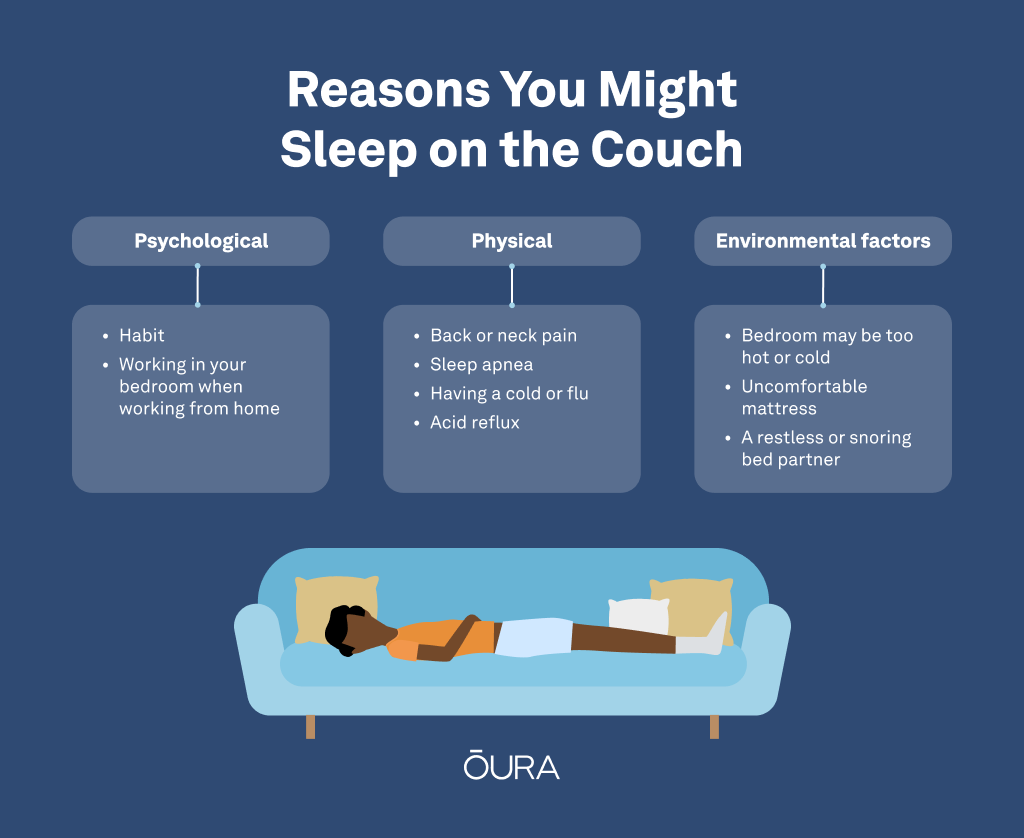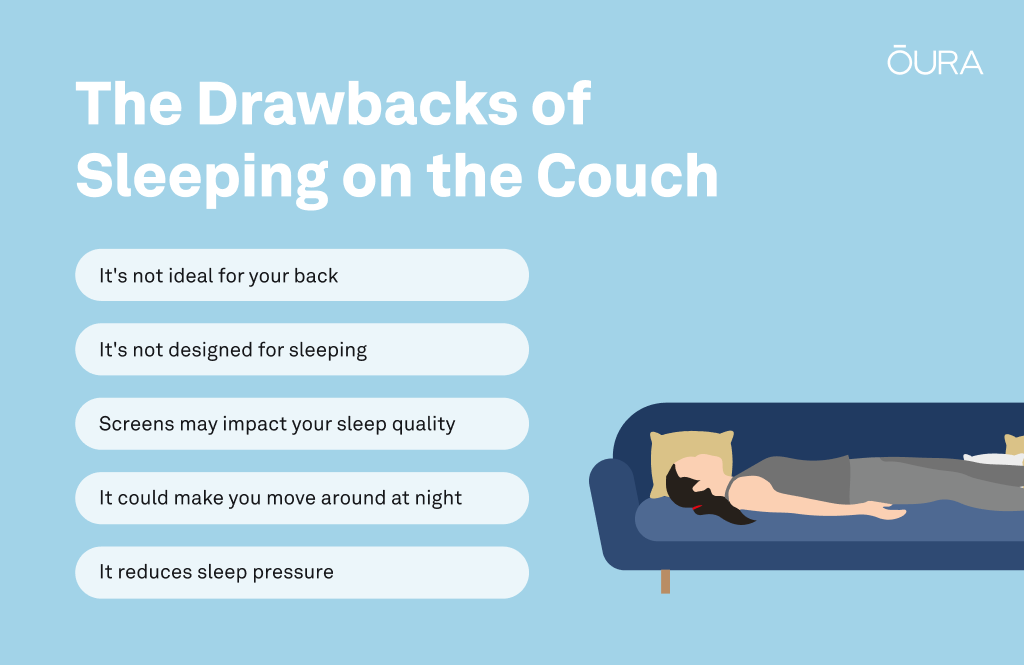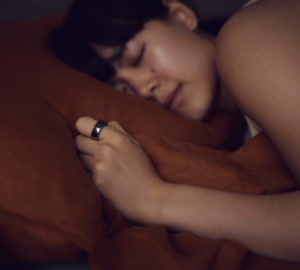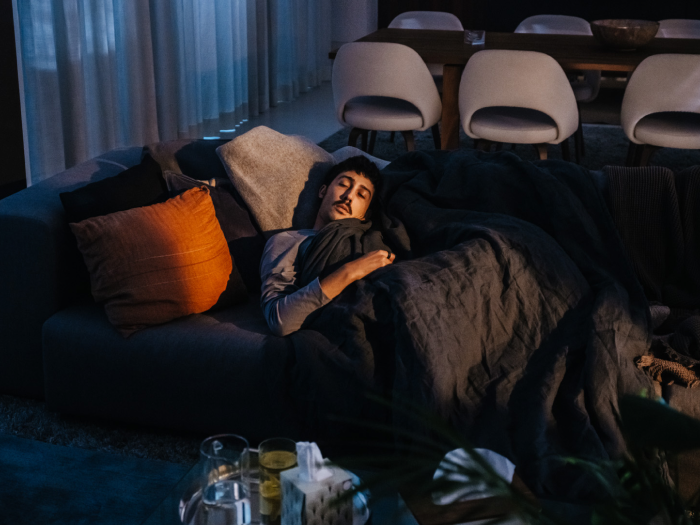After a long day, you probably look forward to curling up on the couch for some well-earned relaxation — reading a book, catching up on your favorite shows, or snuggling with a loved one or pet.
If that sounds familiar, you might have noticed how easy it can be to find yourself sleeping on the couch. For some people, this might be an occasional occurrence, while for others, it may happen most nights.
Sleeping on the couch for long periods of time can leave you feeling groggy the next day, yet some people find it easier to sleep on the couch than in bed. So why is that? And does it really matter?
To answer these questions, let’s explore some reasons why you might prefer sleeping on the couch, its potential drawbacks, and some ways couch sleepers can get a better night’s sleep.
| Member Tip: Use a Custom Tag when you sleep on the couch, and check out how it affects your Sleep Score over time. |
Why You End up Sleeping on the Couch
There are many reasons why you might fall asleep on the couch, ranging from physical comfort to psychological or environmental factors. Here are some of the most common.
Psychological Cues
If falling asleep on the couch is a regular habit, it may be that your body has become accustomed to getting drowsy simply from routine. Turning down the lights and associating the couch with relaxation can create associations in your mind between sitting (or lying) on the couch and falling asleep.
Additionally, working from home for many people means having to work in their bedrooms, which can create associations between their sleeping space and stressful or anxiety-inducing activities.
You may also be among the growing number of people who fall prey to “revenge sleep procrastination.” This is the act of delaying bedtime in favor of pleasurable activities you may not have had time for during the day. Although your intention may be to stay awake during these activities, if you’re tired, they may lead to falling asleep on the couch.
People with insomnia may find sleeping on the couch easier than sleeping in bed. Chronic insomnia can cause you to feel stressed when you go to bed, which can prevent you from sleeping. Having a change of scenery by sleeping on the couch for a few nights can help you recalibrate and get some shuteye. However, this can quickly turn into a habit that’s hard to break.
RELATED: Revenge Sleep Procrastination: How ADHD Affects Your Bedtime
Physical Causes
Some people may have physical reasons for preferring to sleep on the couch. For example, those with chronic neck pain may find the armrest provides additional neck support throughout the night.
Elevating the head and neck while you sleep has other advantages. For instance, if you have sleep apnea, it may help to keep your airway open. If you just have a heavy cold, you might find it easier to breathe in this position. Gastroesophageal reflux disease (GERD) symptoms can also be alleviated by keeping the head raised while sleeping.
| Member Tip: Check the Blood Oxygen Sensing (SpO2) feature and Breathing Regularity chart in the Oura App to discover if you’re experiencing any breathing disturbances during the night. |
Environmental Reasons
If the sleep environment in your bedroom is less than optimal, it may lead to a preference for sleeping on the couch. Possible reasons include:
- If your bedroom can get too hot or cold at times, while the living room remains a comfortable temperature, sleeping on the couch may seem more appealing.
- You may have an uncomfortable mattress and be more comfortable on the couch.
- If you share a bed with a person (or animal) who moves, snores, or takes up a lot of space, you may be tempted to sleep on the couch for a more restful sleep.
- If sleeping on the couch allows you to avoid disruptive sounds, light, or temperatures, it could promote more restorative sleep.

Drawbacks of Sleeping on the Couch
So is sleeping on the couch a bad idea? While there’s no definitive answer, it may not be the greatest choice. Here’s why.
It’s Not Ideal for Your Back
Couches tend to be smaller and odder-shaped than beds, and the limited space can cause sleepers to curl up in awkward positions or hang off the edge of the couch.
These unfavorable sleeping positions may strain neck muscles or cause or aggravate lower back pain, which, in turn, can lead to poor-quality sleep. Continuing to sleep this way over time can even cause more serious medical conditions, such as heart problems.
READ MORE: The Best Sleeping Position for Lower Back Pain
It’s Not Designed for Sleeping
Mattresses are designed to support your body throughout the night — and couches aren’t.
A firm mattress supports your weight and helps maintain correct spinal alignment. It’s also made from more comfortable and breathable materials that help regulate your body temperature and prevent excessive sweating during the night.
Screens May Impact Your Sleep Quality
For many people, sleeping on the couch means sleeping with televisions blaring and blue light glaring.
Research indicates that blue light from screens interferes with sleep by increasing sleep latency and reducing sleep duration and efficiency, leading to increased daytime sleepiness and impaired memory and cognitive functioning.
| Member Tip: If you spend a night on the couch, check out your sleep contributors like sleep latency, duration, and efficiency on the Sleep Tab to better understand the impact on your sleep quality. |
It Could Make You Move Around at Night
Say you wake up in the middle of the night, the lights are out, and your partner has gone to bed. Maybe you’re a little uncomfortable on the couch, so what do you do? Get up and move to the bed, of course.
While you’re more likely to get better sleep in bed, the additional nighttime movement may negatively affect your sleep quality by causing stretches of awake time during the night.
It Reduces Sleep Pressure
Sleep pressure builds up throughout the day in response to your body’s need for deep sleep. The longer you’re awake, the greater the sleep pressure you’ll feel. Once you start sleeping, your sleep pressure starts to decrease.
Therefore, when you fall asleep on the couch, the sleep pressure you’ve built up during the day decreases — meaning that when you eventually get up and go to bed, you may find it harder to go back to sleep.

What if I Can Only Sleep on the Couch?
While it’s okay to spend a few nights on the couch as a temporary solution to some of the problems mentioned above, it’s generally not a good idea to make it a permanent state of affairs.
However, if sleeping on the couch is an absolute necessity, here are some ways to promote sound sleep while doing it.
- Try to be conscious of your sleeping position, as you may have to switch up your sleep posture to suit the couch. For instance, given how narrow couches are, back sleeping may be the most comfortable sleeping position.
- Choose the right bedding and pillows. This will increase comfort and help prevent strain on your back and neck. Avoid throw pillows and add a set of sheets to the couch to help you sleep comfortably.
- If you have a couch bed, open it at night so that you have more space.
- Ensure your head and neck are well elevated and supported. This will increase overall support and help with spinal alignment.
- Limit screen time, as the blue light from screens can mess with your circadian rhythm and keep you from getting enough sleep.
- Add self-care into your routine, as this can help you control any psychological issues preventing you from sleeping in bed. Incorporating meditation or guided breathing techniques into your bedtime routine may help.
- Practice good sleep hygiene (even when sleeping on the couch).
- Set a sleep schedule and stick to it.
- Consider seeing a medical professional to help with your sleep issues.
RELATED: How to Break Bad Sleeping Habits











